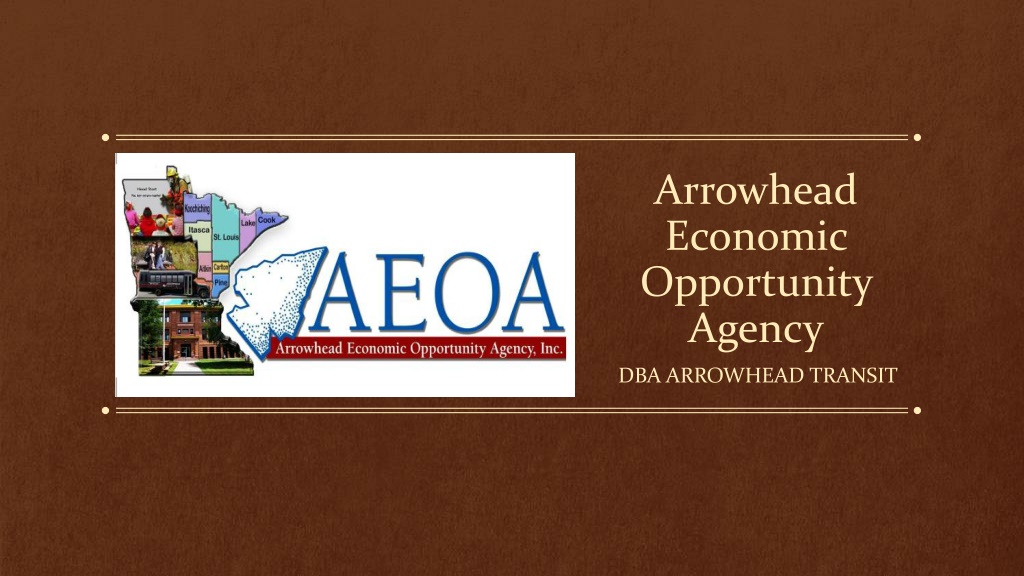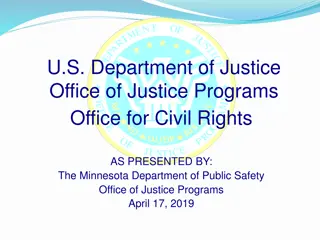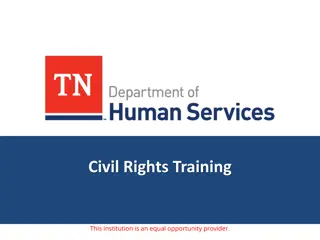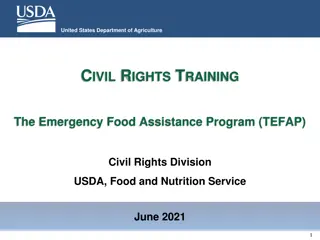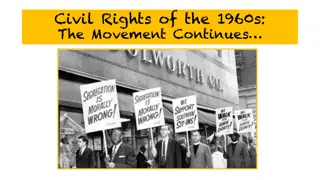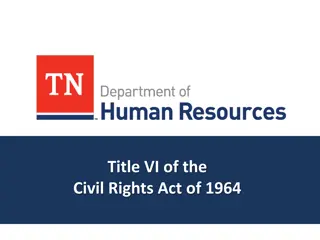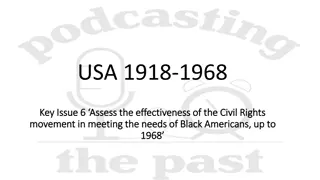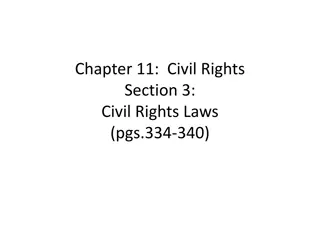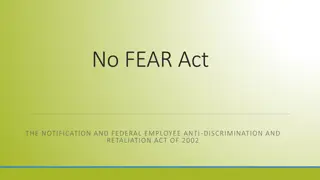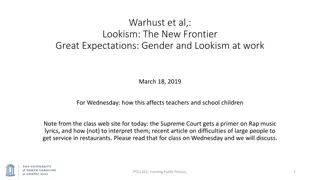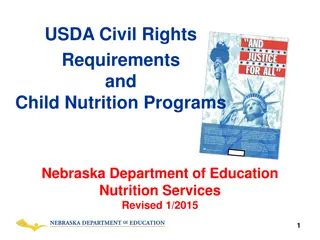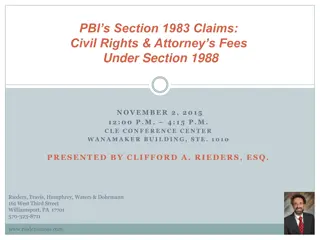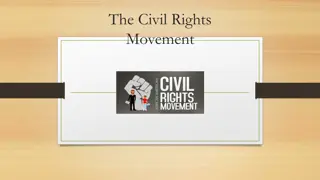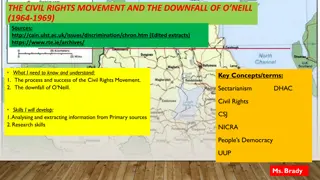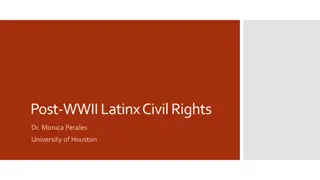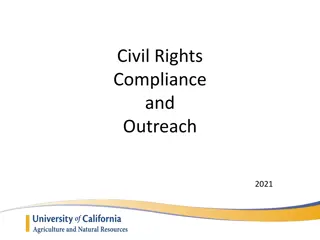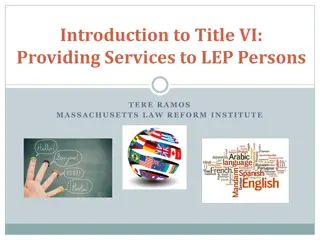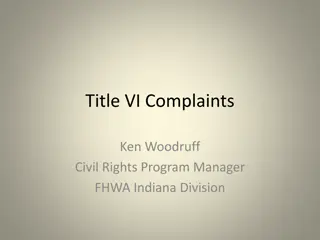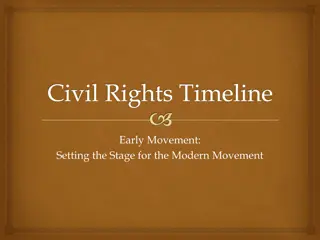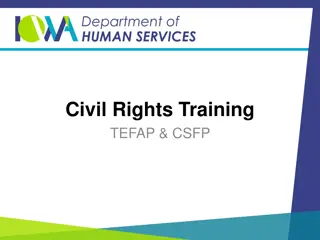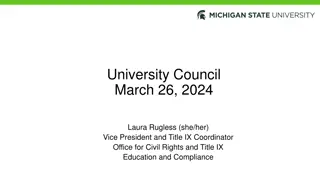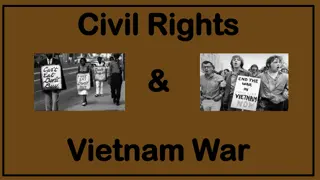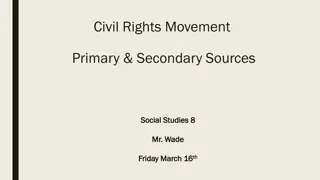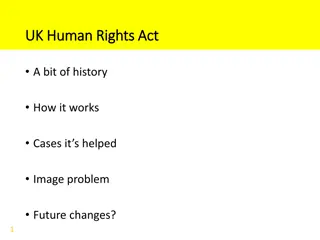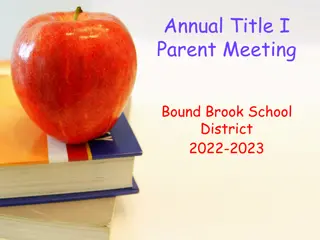Understanding Title VI of the Civil Rights Act
This content discusses the importance of Title VI training to comply with federal regulations. It covers the purpose of Title VI of the Civil Rights Act of 1964, prohibited actions, and the Language Assistance Plan. Employees will learn to define Title VI, identify prohibited actions, understand the purpose of the Language Assistance Plan, and learn how to implement it effectively.
Download Presentation

Please find below an Image/Link to download the presentation.
The content on the website is provided AS IS for your information and personal use only. It may not be sold, licensed, or shared on other websites without obtaining consent from the author. Download presentation by click this link. If you encounter any issues during the download, it is possible that the publisher has removed the file from their server.
E N D
Presentation Transcript
Arrowhead Economic Opportunity Agency DBA ARROWHEAD TRANSIT
Title VI Training: FTA Requirements Why Do I Need Training? The purpose is to meet Federal Transit Administration s requirement to comply with Title VI of the Civil Rights Act of 1964. Civil Rights Act of 1964 Subrecipients/grantees of the Agency must have all relevant staff review the attached PowerPoint training individually or as a group. After reviewing the training each staff member should sign the acknowledgement form link and the Certificate of Completion will become a part of your personnel file. Guidance Protocols
Introduction and Learning Objectives This presentation will define Title VI of the Civil Right Act of 1964. This presentation will describe actions prohibited under Title VI protections. This presentation will define the purpose and describe the (LAP) Language Assistance Plan. Completing the training, employees will be able to: Define Title VI; Identify actions prohibited under Title VI; Identify the purpose for the Language Assistance Plan; and Identify how to implement the Language Assistance Plan
Title VI of the Civil Rights Act of 1964 Title VI Title VI of the Civil Rights Act of 1964 is a federal law that protects individuals and groups from discrimination on the basis of race, color and national origin in programs and activities that receive federal financial assistance. Specifically, 42 USC 2000d states: "No person in the United States shall, on the ground of race, color, or national origin, be excluded from participation in, be denied the benefits of, or be subjected to discrimination under any program or activity receiving Federal financial assistance."
Items Prohibited Under Title VI AEOA/Arrowhead Transit is committed to ensuring compliance with Title VI and that no person/group is: Excluded from participation in programs or activities; Denied program services or benefits to individuals or groups; Provided a different service or benefit, or provide them in a manner different from what is provided to others; Denied an opportunity to participate as a member of a planning, advisory or similar body that is an integral part of the program; or Retaliated against as an individual for filing a discrimination complaint or participating in an investigation into a complaint, on the basis of race, color, or national origin.
Resources MnDOT s Title VI website Federal-Aid Highway Act of 1973 Section 504 of the Rehabilitation Act of 1973 Americans with Disabilities Act of 1990 Age Discrimination Act Executive Order 12898 Executive Order 13166 Civil Rights Restoration Act of 1987 FHWA Notice N 4720.6 Minnesota Human Rights MnDOT s Policy Website
Language Assitance Plan Purpose is to meet Federal Transit Administration s (FTA) requirements to comply with Title VI of the Civil Rights Act of 1964, which prohibits discrimination on the basis of race, color, or national origin. The LAP For AEOA/Arrowhead Transit consists of the following: A needs assessment based on the Four-Factor Analysis Language assistance measures Methods for notifying LEP persons about available language assistance Methods of monitoring, evaluation, and updating the plan
Four Factor Analysis & Language Assistance Measures The Four-Factor analysis is an individualized assessment that is applied to all transportation system programs and activities to determine what reasonable steps must be taken to ensure meaningful access for LEP individuals. Measures 1. Arrowhead determined LEP language assistance is at a low level ; however efforts will be made to reasonably accommodate any language access requests that may arise. A public participation log will be provided to staff to document all interpretation and translation services provided proactively or upon request. The public participation plan will outline the process for engaging and involving the public, including minority and LEP population. 2. 3.
Public Participation Plan & Strategies The purpose for the Public Participation Plan is to integrate consideration of the viewpoints of minority, low income, and limited English proficiency (LEP) populations into the Transit s system community outreach activities. Strategies 1. AEOA/Arrowhead Transit will offer adequate notice of public participation activities in the planning stages and throughout. Notice of free language assistance will be posted in areas that the public and staff have access to during activities. All language assistance services will be recorded on the Public Participation Log. Strategies to involve minority and LEP populations in effective participation in our decision progress and serve on appropriate committees, groups, board, etc. will be implemented. 2. 3. 4.
Public Participation Plan continued Microsoft Teams is a tool that may be used in communication with LEP individuals attending an online public engagement event. Surveys are an opportunity to gain public input and obtain insights on opinions of and feedback on the usage or lack of use of the public transit system, services, and information. Website and online documents as appropriate. All facilities have interactions with the public in-person and will display the Public Notice of Rights Under Title VI in a location that is accessible to the public. Outreach: The following outlines the practices that AEOA/Arrowhead Transit will take in community outreach: 1. Schedule meetings at times and locations that are convenient and accessible for minority and LEP communities. 2. Give adequate notice of public participation activities in the planning stages and opportunities for participation. 3. Implement adjustable innovative meeting strategies, locations, and group sizes to gain viewpoints of minority, low-income, and limited English proficiency participation. 4. Collaboration and coordination with various community organizations, specifically to members of affected minority and/or LEP communities.
Any Questions, Please Contact AEOA Human Resources Department CATHY PAZZELLI 218-748-7350 cathy.pazzelli@aeoa.org
